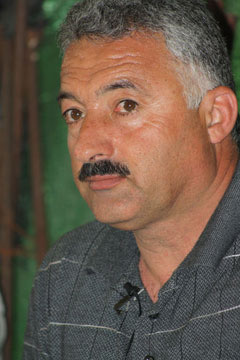Fakhri Abu-Diab -- "I'm living in Hell"
By J.David

(Photo Credit: Tara Graham)
EAST JERUSALEM -- "They may be building heaven, but I am living in hell," Fakhri Abu-Diab says in response to the Israeli government's proposed plan to erect a Jewish tourist site in King David's garden.
Abu-Diab, 48, a resident of the Al-Bustan neighborhood in the Silwan quarter of East Jerusalem, is in danger of having his house demolished to make room for the historical destination, which is believed to be the place where King David wrote many of the biblical psalms. But Abu-Diab is less concerned with events 2,000 years ago, than the drama currently unfolding in his neighborhood. In a makeshift tent, which serves as a community center, he presides over a local effort to stop the development, and the bulldozers that threaten his home, too.
"The bulldozers come with a host of soldiers like they are conquering the land, and we can't stand in front of them and stop them," Abu-Diab says with a hint of anger in his voice. "All we can do is use the legal system, call on the international community to pressure Israel and wait for our day."
Abu-Diab's struggle isn't just about the 88 homes that have active demolition orders assigned to them. It's also about the 1,500 residents who will be forced to uproot their families from homes and heritages.
"I was born in my house," Abu-Diab says. "And my house was my father's house, and before that, my grandfather's house. I can still smell my mother in the room where I was born."
Like his father and grandfather, Abu-Diab witnessed the birth of his first child in the one-room house. After the birth of another child, Abu-Diab realized that his family needed more space.
"I went to the Municipalities to gain a permit, and for three years, they refused to let us build," he complains. "And now they're making us into 'outlaws' by alleging that we're illegally building on the property. I had no choice but to build without a permit."
There are nearly 10,000 Palestinian homes on the verge of collapse in the Silwan valley because the municipal authorities of Jerusalem refuse to issue the necessary permits to repair them, Abu-Diab explains.
"But Jewish settlers have built houses right next door to me," he adds. "And the authorities don't give them fines or problems."
There are 14 people, including five grandchildren, living under Abu-Diab's roof. The whole household lives in constant fear of demolition and the possibility of returning home from work or school one day to find an empty lot where their home once stood.
"My kids ask, 'What will happen to us if they demolish our house? What will we do?'" Abu-Diab says with his eyes focused on the ground. "I try to avoid this question, and I lie to them because I don't want them to live under the stress and fear of demolition."
The first demolition order arrived at Abu-Diab's doorstep in 2005. Since then, he lives in fear, which his children sense.
"They ask me how I can speak to the Israelis when they only want to demolish our homes," Abu-Diab says with a pained look on his face. "These problems are pushing young Palestinians to radicalism and extremism."
Despite this, Abu-Diab promotes non-violent means of protest.
"I fear that if we respond with violence, I will not only lose my house, I will lose my people," he says while shaking his head.
Saturday, the Jewish day of rest and worship, is the one day every week when Abu-Diab and his neighbors let their guard down and forget the fear that lingers over the community.
But on this breezy Saturday, Abu-Diab remains tense.
"I love life, but I would rather be in my house when the bulldozers come to demolish it," he says, while looking in the direction of the valley and the clutter of homes in the distance. "That way, they will demolish my house with me inside it."
"I just couldn't bear the sight of my wife and children homeless," he says.
